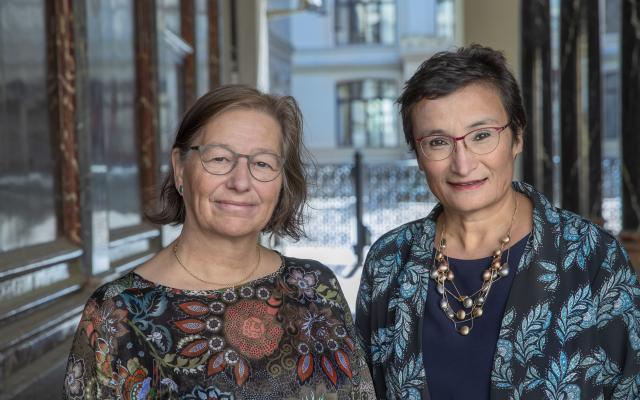
Wallenberg Foundations Launch Initiative for Humanistic and Social Scientific Research in AI and Autonomous Systems
AI, machine learning, robotization… the ongoing technological transition will impact our society and our behaviors in diverse ways. The Wallenberg Foundations are now investing up to SEK 660 million in the WASP-HS research program, whose purpose is to study the changes resulting from the technological transition.
“HS” stands for humanities and society. First and foremost, the program will analyze potential ethical, economic, labor market, social and legal aspects of the transition.
“Knut and Alice Wallenberg Foundation has already invested SEK 3 billion in basic research under the auspices of WASP – the Wallenberg AI, Autonomous Systems and Software Program. But we must not forget that new technology also changes the daily lives of many people, and society at large,” comments Peter Wallenberg Jr, Chair of Marianne and Marcus Wallenberg Foundation.
Against this background, Marianne and Marcus Wallenberg Foundation, which primarily funds research in the social sciences, and Marcus and Amalia Wallenberg Foundation, which mainly funds research in the humanities, are launching a joint initiative to support WASP-HS – a ten-year research program.
The program will be hosted by Umeå University.
“We’re delighted that overall responsibility for this initiative has been placed in our hands. It’s an important field offering huge potential. The transition towards a society in which artificial intelligence and autonomous systems permeate our lives is still in its infancy,” says Hans Adolfsson, vice chancellor of Umeå University.
Internationally Pre-eminent AI Researchers
One of the main reasons for basing the program in Umeå is Professor Virginia Dignum. She was one of the first professors recruited to Sweden as part of the WASP AI initiative, and she will be the research director of WASP-HS.
“Among other things, we will be examining methods and tools for ensuring that AI and autonomous systems are designed so they don’t clash with human values and ethical principles,” says Professor Dignum, who researches on societal, ethical and cultural implications of AI at Umeå University.
The program is interdisciplinary, combining humanities and social sciences with technological research.

Kerstin Sahlin and Virginia Dignum. Photo Magnus Bergström.
“WASP-HS will run a large graduate school, with up to 70 PhD students, and will recruit at least ten new research teams and twelve visiting professors. One of the primary aims of WASP-HS is to strengthen Swedish research expertise in the field, with doctoral courses and recruitment of young researchers and visiting researchers,” says Professor Kerstin Sahlin, chair of WASP-HS.
WASP-HS is independent of WASP but the two programs are run in close collaboration.
“This means that WASP-HS will be conducting independent studies of the impact of technology on entrepreneurship and society, and will also collaborate with WASP on the doctoral program, among other things,” Dignum explains.
A central feature of the program is international collaboration in the form of partnership, visiting researchers, and postdoc positions abroad.
Background
WASP
The Wallenberg AI, Autonomous Systems and Software Program (WASP), is Sweden’s largest private research initiative ever. The aim is to put Sweden at the international forefront in the field of software, autonomous systems and AI. The Foundation’s financial commitment totals SEK till 3 billion to 2026. Together with co-funding from the universities involved and Swedish industrial concerns, the entire initiative is worth SEK 4 billion.
Virginia Dignum
Virginia is a Professor of Social and Ethical Artificial Intelligence, and an internationally respected researcher in AI. She plays an active part in a number of international initiatives to develop political and strategic guidelines for AI research and applications. Among other things, she is one of 52 experts appointed to present guidelines and recommendations for Europe’s AI strategy, and is a member of the World Economic Forum Global Fourth Industrial Revolution Council on AI.
Kerstin Sahlin
Kerstin is Professor of Public Management at Uppsala University. During 2013–2018 she was deputy vice chancellor of Humanities and Social Sciences at the Swedish Research Council. From 2006 to 2011 she was Deputy vice chancellor of Uppsala University. She is currently vice president of the Royal Swedish Academy of Sciences.
Contact persons
Peter Wallenberg Jr, Chair of Marianne and Marcus Wallenberg Foundation
Tel: +46 (0)8 545 01780
E-mail: [email protected]
Virginia Dignum, Professor and scientific director, WASP-HS, Umeå University
Tel: +46 (0)720 850890
E-mail: [email protected]
Kerstin Sahlin, Professor and Chair, WASP-HS, Uppsala University
Tel: +46 (0)70 4250798
E-mail: [email protected]
The Wallenberg Foundations is the umbrella name for the charitable foundations formed by members of the Wallenberg family.
The Foundations fund pre-eminent researchers and research projects for the benefit of Sweden, and have awarded grants totaling approximately SEK 33 billion since 1917, of which almost SEK 10 billion has been awarded over the past five years.
